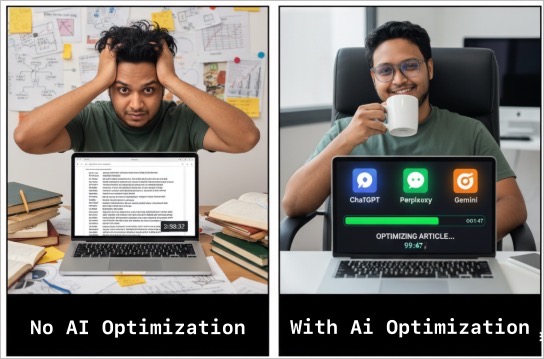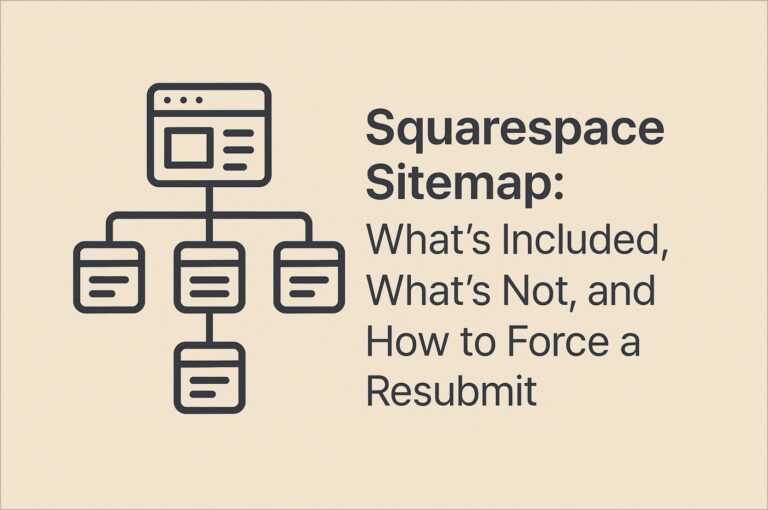How ChatGPT, Perplexity & Gemini Are Reshaping Squarespace SEO (and What To Do About It)
If you own a Squarespace website, you may have noticed something strange in your analytics lately. Traffic is steady one month, then mysteriously down the next—yet you’re ranking for the same keywords. What’s happening?
The culprit: AI-powered search engines.
Tools like ChatGPT (with browsing), Perplexity, and Google’s Gemini AI Overviews are reshaping how people find and consume information. Instead of clicking websites, users increasingly get their answers directly from AI.
That’s great for convenience. Not so great if you’ve spent hours perfecting your Squarespace blog post only to see your audience stop clicking through.

But don’t despair. With the right tactics, you can still make AI work for you. In this article, I’ll explain:
- How ChatGPT, Perplexity, and Gemini affect Squarespace SEO.
- What they “see” when crawling or summarizing your content.
- Squarespace’s SEO strengths and weaknesses in the AI era.
- Practical steps you can take (with examples, FAQs, and even schema-ready strategies).
This is a big-picture strategy guide with Squarespace-specific action steps. Let’s dive in.
1. The AI Search Shift: From SERPs to Summaries
Answer-first: AI-driven search means fewer clicks, but more opportunities to be cited as the source.
The Stats You Can’t Ignore
- Google AI Overviews (Gemini): Appear in 10–13% of queries depending on category. This number is climbing quarter by quarter.
- Click-through rates (CTR): When an AI summary appears, CTR drops from around 15% to 8% for traditional links. That’s nearly a 50% traffic reduction.
- ChatGPT & Perplexity referrals: Some traffic flows from these tools, but it’s far smaller than classic Google search. Still, brand exposure matters.
📊 Table: Traditional vs. AI-Driven Search
| Factor | Old Google SERP | AI Engines (ChatGPT, Perplexity, Gemini) |
|---|---|---|
| User Behavior | Click results | Read answers, sometimes click |
| SEO Goal | Rank high | Be cited as a trustworthy source |
| KPIs | Rankings, CTR, backlinks | Citations, mentions, impressions |
| Squarespace Challenge | Metadata, sitemaps | Schema, structure, entity clarity |
💡 Humor break: Remember when Google gave you 10 links? Now it gives you one paragraph and a pat on the back.
2. How ChatGPT, Perplexity & Gemini “Read” Your Content
Answer-first: Each AI engine processes content differently, so your Squarespace site must cater to multiple reading styles.
ChatGPT
- Pulls from training data and browsing.
- Sometimes cites, often paraphrases.
- Loves clear structure, concise definitions, and factual content.
Perplexity
- Built on citations. Displays links in a sidebar.
- Best chance to drive traffic if your content is concise and unique.
- Example: A “5-Step Squarespace SEO Setup” guide is more likely to get cited than a vague “SEO tips” post.
Gemini (Google AI Overviews)
- Prioritizes schema, tables, FAQs, and structured content.
- Integrated into Google Search, so your traditional SEO and AI SEO overlap.
- If you’re not optimizing for snippets, you’re invisible.
👉 Takeaway: If you don’t spoon-feed AI with structured, clear, factual bites, it will pick someone else’s site instead.
3. Squarespace SEO in 2025: Strengths and Weaknesses
Answer-first: Squarespace gives you a strong base, but lacks advanced flexibility for AI-focused SEO.
Strengths (the “good news” list)
- Auto-generated XML sitemaps.
- SSL certificates included.
- Mobile-responsive templates (Google loves this).
- Good page speed performance.
Weaknesses (the “uh-oh” list)
- Limited schema markup options.
- Need code injection for advanced SEO features.
- Less plugin ecosystem compared to WordPress.
💡 Analogy: Squarespace SEO is like a Tesla—it’s sleek, fast, and efficient. But when it comes to customizing the engine, you’re limited by what the factory allows.
4. Answer Engine Optimization (AEO) for Squarespace
Answer-first: AEO means structuring your blog to look irresistible to AI answer engines.
Tactics to Implement
- Answer-first paragraphs: Start with a concise 40–50 word definition.
- Definition sentences: Always define jargon immediately.
- Example: “AEO, or Answer Engine Optimization, is the process of structuring content for AI and voice search engines.”
- FAQ sections: Use “People Also Ask” style queries.
- Lists & tables: These are AI candy.
📊 Example: AEO-Ready Snippet
Q: Can Squarespace handle structured data?
A: Yes, but you’ll need to manually add JSON-LD through code injection, especially for FAQ, HowTo, and LocalBusiness schema.
👉 Squarespace tip: Use the Code Injection panel (Settings → Advanced → Code Injection) to add schema site-wide or page-specific.
5. Generative Engine Optimization (GEO) & Large Language Model Optimization (LLMO)
Answer-first: GEO/LLMO focus on making your content digestible and memorable for AI engines.
5.1 Write for Entities, Not Just Keywords
- Name your brand, services, and locations explicitly.
- Don’t say “we”—say “Sitab Studio, a Squarespace SEO agency in Toronto.”
5.2 Structure Facts Like Knowledge Graphs
- Example: “Retinol is a vitamin A derivative that stimulates collagen production.”
- Why? LLMs store facts as subject–predicate–object relationships.
5.3 Build Topic Hubs
- Create cornerstone pages (“Squarespace SEO Guide”) with internal links to subtopics (“Squarespace Schema,” “Squarespace Sitemaps”).
- Helps LLMs identify your site as a topical authority.
5.4 Add Unique Data & Citations
- Use stats, screenshots, or case studies.
- AI engines prefer citing “fresh” and “factual” data.
💡 Humor break: Think of AI as the nosy neighbor who remembers everything you say. Better make sure what you say is factual and flattering.
6. The Squarespace AI SEO Checklist
Answer-first: Here’s your survival kit—12 must-do tasks.
✅ Checklist:
- Write a <50 word summary at the top of each article.
- Add definition sentences under every H2.
- Include an FAQ block with 3–5 Q&As.
- Use tables for comparisons and lists for steps.
- Add JSON-LD (FAQ, HowTo, LocalBusiness, Product).
- Optimize alt text for images with entities.
- Build topic hubs with deep internal links.
- Keep titles, slugs, and metadata keyword-aligned.
- Cite authoritative external sources.
- Add publish/update dates.
- Use author bios with credentials for E-E-A-T.
- Refresh content quarterly.
📊 Implementation Table
| Step | Why It Matters | How to Do It in Squarespace |
|---|---|---|
| FAQ schema | AI loves FAQs | Add JSON-LD in Code Injection |
| Tables & lists | Easy AI parsing | Use built-in Table Block |
| Alt text | Entity clarity | Add descriptive alt tags in Image Block |
| Topic hubs | Topical authority | Interlink blog posts via Summary Blocks |
7. Measuring Success in the AI Search Era
Answer-first: Success now = visibility + citations, not just rankings.
Traditional Metrics vs. AI Metrics
| Old SEO | AI SEO |
|---|---|
| Rankings | Still relevant |
| CTR | Dropping in AI-heavy SERPs |
| Impressions | Compare vs. AI overview impressions |
| Citations | New KPI |
| Mentions in AI | New KPI |
How to Measure on Squarespace
- Use Google Search Console filters to track CTR when AI Overviews appear.
- Monitor referral traffic from ChatGPT and Perplexity (UTM tags help).
- Track brand mentions in AI summaries (manual but insightful).
8. Risks, Attribution & The Publisher Debate
Answer-first: AI is powerful but comes with controversy.
- Perplexity citations: Sometimes incomplete or disputed.
- Publisher lawsuits: News orgs are fighting AI scraping.
- Your playbook: Focus on authority and expertise—make your content so credible that AI engines can’t ignore you.
💡 Humor break: If AI is going to copy your homework, at least make sure it spells your name correctly.
9. Future-Proofing Your Squarespace SEO Strategy
Answer-first: AI isn’t a fad—it’s the new front door to the web.
- Don’t just optimize for rankings; optimize for being the answer.
- Embrace structured data, FAQs, and topical hubs.
- Monitor AI-driven referrals, not just Google.
- Treat AI engines as your new audience.
Conclusion
ChatGPT, Perplexity, and Gemini are reshaping SEO. For Squarespace site owners, this isn’t the end of SEO—it’s the start of a new game.
The winners will be those who:
- Write structured, factual, answer-first content.
- Implement schema and FAQs.
- Build topical authority through hubs and interlinking.
- Track AI citations as a new metric of success.
Because in the AI era, it’s not just about ranking—it’s about being the source AI cites.
👉 Ready to future-proof your Squarespace SEO? Start with a site audit, implement the 12-step checklist, and make your content AI-proof.
FAQs
Q: Do AI Overviews reduce clicks for small businesses?
Yes. CTR can drop by almost half when AI summaries appear.
Q: Can Squarespace add FAQ schema?
Yes, but you must inject JSON-LD manually.
Q: Is Perplexity a traffic source or just a visibility tool?
Both—but don’t expect Google-level referrals.
Q: How do I get cited by ChatGPT or Gemini?
Use concise, structured, factual content with unique data.

